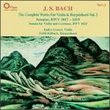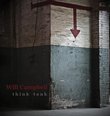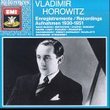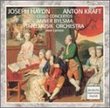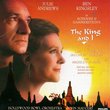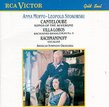| All Artists: Barry Kolman Title: HUSA: Music for Prague 1968 / Reflections / Fresque Members Wishing: 0 Total Copies: 0 Label: Marco-Polo Release Date: 7/31/2009 Genre: Classical Styles: Opera & Classical Vocal, Symphonies Number of Discs: 1 SwapaCD Credits: 1 UPC: 730099364027 |
Search - Barry Kolman :: HUSA: Music for Prague 1968 / Reflections / Fresque
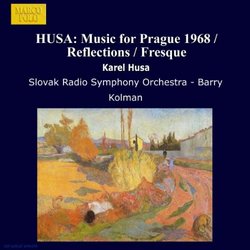 | Barry Kolman HUSA: Music for Prague 1968 / Reflections / Fresque Genre: Classical
HUSA: Music for Prague 1968 / Reflections / Fresque by Barry Kolman |
Larger Image |
CD DetailsSynopsis
Album Description HUSA: Music for Prague 1968 / Reflections / Fresque by Barry Kolman Similar CDs
Similarly Requested CDs
|
CD ReviewsNo music lover should go without experiencing Husa! Discophage | 01/25/1999 (5 out of 5 stars) "This is an unusual review in that I have never actually heard "Music for Prague 1968" as a member of an audience. However, I have had the immense honor of playing this piece in a very respectable college wind ensemble. Husa's work is not only powerful and moving, but a listener (or a performer like me) leaves the experience forever changed. I saw an audience sit for a full minute in complete silence at the conclusion of the Tocatta- no one dared to applaud. Innovative and inspiring, Husa is at his emotional best in these selections." A good introduction to the orchestral music of Karel Husa Discophage | France | 02/10/2007 (4 out of 5 stars) "Karel Husa is an important American composer born in Prague, Czechoslovakia in 1921. After initial music training in his home country, he lived in Paris from 1947 to 1954, resisting a summon from the Czech government spawn from the Communist seizure of power in the early months of 1948 to return to his homeland. In Paris he studied composition with Honegger and Nadia Boulanger and conducting with Eugène Bigot, Jean Fournet and André Cluytens, and already attracted some attention as a composer, earning prizes for his 1st string quartet from 1948. In 1954 he answered an invitation of Cornell University in Ithaca, New York, to become composition teacher, and established himself in the United States. He became a US citizen in 1959 and remained at Cornell until his retirement in 1992. Husa thus followed a familiar pattern and path to the United States via pre- or post-war Paris, placing him in the good company of composers such as Ernest Bloch, Alexandre Tcherepnin, Miklos Rozsa and Igor Stravinsky (to say nothing of the even more numerous composers who jumped directly from their native country to the New, Sheltering and Promising World). These biographical elements have some bearing on the contents of this present disc, as, though having spent the greater part of his life, and certainly of his years of maturity, in the United States, Husa always remained rather European-looking in his compositional outlook. His arrival in the US began a new, prolific and also more mature and personal chapter in his compositional career. He once stated that he probably would have been a much more conservative composer had he stayed home. But being confronted both to the past-masters and past masterpieces which he felt there was no point in trying to emulate, and to the intellectual turmoil that had seized the European composition scene in the post-war years, Husa was led to embrace many the new techniques (aleatoric procedures, quarter tones, polytonality, search for new sonorities), but without relinquishing the link to the past forms. A few years ago he declared: "I accept new things. I'm not revolting against something new. On the contrary, I think there must be some potential good in new things. (...) The avant guard is the faction that keeps us going on ahead", and also "in many ways I am a traditionalist. Perhaps not in that exact term, but I have roots that came from the past." As the disc's liner notes put it, "Husa's musical rhetoric represents an amalgamation of past and present, successfully combining contemporary harmonic idiom with an almost neo-classical attention to balance, clarity and form (...), and his synthesis of old and new elements has made his music enjoyable and accessible to the general listening public" Fresque dates from Husa's early, Paris years (1949). It was written under the influence of Honegger and, as the liner notes point out, is reminiscent of the Swiss composer's symphonic poem "Rugby" - but I also hear in it echoes of early Bartok, the composer of the 4 pieces for orchestra Op. 12 and The Wooden Prince - Husa being here rather less personal. But it is interesting at least as a reminder of where the composer comes from and how far he has gone from there. Music for Prague is Husa's most popular and often played composition. It was written in 1968 in reaction to the Soviet invasion of Czechoslovakia, first for wind band then re-orchestrated for normal symphony orchestra, which is how we hear it here. The music is descriptive, at least on a symbolic plane: the first movement's opening piccolo bird-call represents Prague's new-found liberty, the dramatic outburst of brass and percussion evokes the approaching menace of Soviet tanks, the second movement's funeral march with its bells inspired by Prague's "thousand spires" and its long-held string chords represents the tragedy of the Czech people, the final, majestic peroration, based on the famous a famous Hussite War Song, expresses the enduring hope of the Czech nation. But the music can also be heard and appreciated without any knowledge of the underlying "program", and particularly felicitous is the strikingly original 3rd movement ("Interlude") scored for percussion alone, sounding like an expansion of the beginning of the slow movement of Bartok's first piano concerto. Music for Prague is dramatic, impactful and accessible - in my opinion, just a little too programmatic and cinematographic to belong to the composer's most intellectually nourishing works. The 2nd symphony (subtitled "Reflections") from 1982-3 is the most advanced and, to me, rewarding work on this disc, the one in which Husa's stylistic hallmarks, his exploration of novel sonorities, are the most in evidence. It begins with a mysterious and haunting, sinuous oboe melody with quarter tone slides over a shimmer of string glissandos, slowly building up with long-held string chords to a dramatic, percussion punctuated climax, then receding to a soft, brooding ending played by double-bass and bassoon. With its fast moving 6/8 sixteenth notes, the 2nd movement follows a long string of tradition starting with the Scherzo of Beethoven's 9th symphony and continuing with like movements of Bruckner, Britten, Walton, Tippett; it starts with agitated temple block solo soon turning to a trio with tom-toms and timpani, and is rhythmic and percussive like some wild Caribbean dance, producing lots of tension. Long held string and wind chords with pounding bell-like percussion of great dramatic impact (somewhat reminiscent of the symphonies of Isang Yun) feature prominently in the last movement, which ends with a melismatic flute & alto-flute duo, mirroring the introductory oboe . The symphony may not be not as subtle and sensuous in its orchestration as similar symphonic works by Lutoslawski, nor as daring in its exploration of sonorities as Ligeti, but Husa's language is nonetheless uncompromising but still highly dramatic and accessible. This disc gives a fine overview of the evolution of Husa's compositional style(s) and, given the price, it is one of the best introductions to its composer's orchestral music. Good, informative notes by Leland Jonathan Yee. " Husa is a genious Jeffrey Schellinger | Spring, Texas | 03/12/2000 (5 out of 5 stars) "Also as a performer of this piece, I must say that it is deeply moving from inside the music. Husa uses pure genius to create textures through instruments, and truly makes one feel as though they were in Prague during the Russian invasion. Having a somewhat biased opinion, I personally prefer the Aria (mostly because I play the saxophone) but also because it is a magnificently written work of pure genius. If you like music that tells a story, be prepared to fall in love with Music for Prague 1968!"
|

 Track Listings (8) - Disc #1
Track Listings (8) - Disc #1